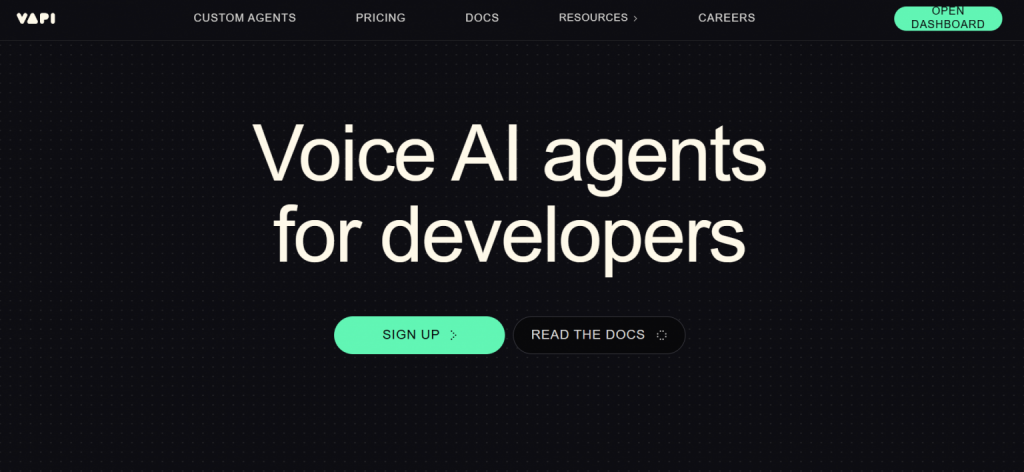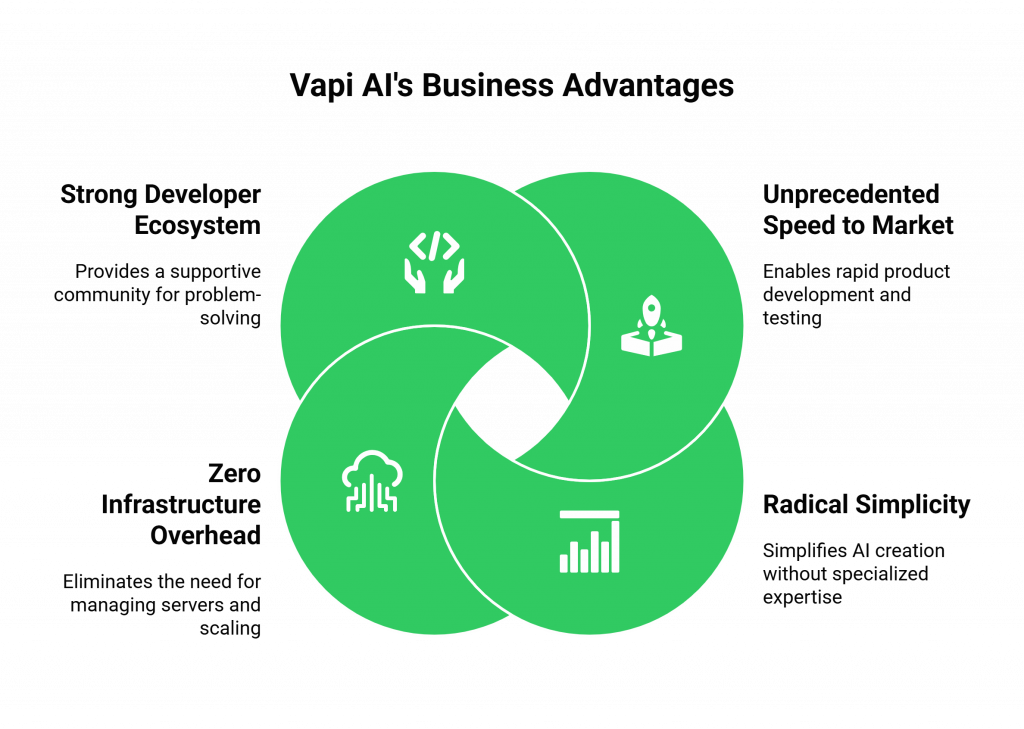Building a truly conversational voice agent from scratch is a formidable task. A developer must expertly weave together a complex tapestry of technologies: a telephony provider to handle the call, a real-time Speech-to-Text (STT) engine, a Large Language Model (LLM) to act as the brain, and a responsive Text-to-Speech (TTS) service to give the agent its voice. Making these systems communicate seamlessly and instantly is a monumental engineering challenge.
This is the very challenge that has given rise to a new wave of developer-first platforms, and Vapi AI has quickly emerged as a prominent player. It offers a powerful promise: to abstract away the immense underlying complexity, allowing businesses to build and deploy sophisticated voice agents with unprecedented speed.
This guide will provide an in-depth look at the key advantages of using Vapi AI for your call automation strategy. We will explore how its approach accelerates development and also examine the natural inflection point where a maturing application requires a more foundational, powerful, and flexible infrastructure to achieve true scale and differentiation.
Table of contents
What is Vapi AI? The Power of a Unified Platform
To understand its benefits, it’s essential to grasp what Vapi AI is. It is an end-to-end, developer-centric platform designed specifically for building voice agents. The core of its value proposition is abstraction. Vapi bundles the entire voice AI stack, telephony, STT, LLM orchestration, and TTS into a single, cohesive, and easy-to-use API.

This means a business can interact with one unified system rather than trying to integrate, manage, and pay for four or more separate, complex services. This radical simplification is the source of its most significant advantages.
Also Read: What Are The Key Advantages of Using Play AI For Automating Calls in Your Business?
The Key Advantages of Using Vapi AI
For businesses, especially startups and teams focused on rapid innovation, Vapi’s all-in-one approach offers several compelling benefits that translate directly to business value.

Unprecedented Speed to Market
The time it takes to go from idea to a functional product can be the difference between success and failure. This is where Vapi shines brightest.
- Drastically Reduced Development Cycles: The traditional process of integrating disparate voice and AI services can take months of specialized engineering effort. With Vapi’s unified API, a development team can have a functional, call-handling voice agent up and running in a matter of hours or days.
- Perfect for MVPs and Prototyping: This speed is a game-changer for building a Minimum Viable Product (MVP). Businesses can quickly build and test a voice AI concept, gather real-world user feedback from actual phone calls, and validate a business case with a fraction of the typical upfront engineering investment.
Radical Simplicity and a Lowered Technical Barrier
One of the key advantages of using Vapi AI is that it democratizes the creation of sophisticated voice AI. You no longer need a team of world-class experts in every component of the stack.
- No In-House Telephony Expertise Needed: The platform handles all the notoriously difficult aspects of real-time communication, such as managing SIP trunks, PSTN connections, and audio codecs. This is a massive benefit, as telephony is a highly specialized and complex field of engineering.
- Seamless AI Orchestration: Vapi manages the real-time flow of data between the STT, LLM, and TTS services. This removes the need for businesses to build their own complex, low-latency orchestration logic, which is a significant engineering task in itself.
Also Read: What Are The Key Advantages of Using Deepgram AI For Automating Calls in Your Business?
Zero Infrastructure Overhead and Predictable Scaling
One of the largest hidden costs in any software project is the operational burden of managing the underlying infrastructure. Vapi’s managed service model eliminates this headache.
- A “Serverless” Experience: Your team can focus entirely on the application’s logic (the “what”) without ever having to worry about the “how”, provisioning, securing, or maintaining servers. The platform handles all aspects of hosting and reliability.
- Effortless Scalability: As your call volume grows from ten to ten thousand concurrent calls, the platform’s infrastructure scales automatically to meet the demand. This provides immense business value, removing the need for a dedicated DevOps team to manage scaling and uptime.
A Strong and Active Developer Ecosystem
A tool is often only as good as its support system. Vapi has cultivated a vibrant community that serves as a valuable resource for businesses. Your development team can get help, share solutions, and learn best practices from their peers, which accelerates problem-solving and innovation.
Conclusion: The Right Tool for Every Stage of Your Business Journey
There are clear and powerful advantages of using Vapi AI. It is an outstanding tool that delivers on its promise of speed and simplicity, making it an ideal choice for building prototypes, MVPs, and getting to market faster than ever before. It effectively de-risks the initial stages of voice AI development for any business.
As your business achieves product-market fit and the demands for performance, customization, and differentiation grow, a more powerful foundation becomes necessary.
A dedicated voice infrastructure platform like FreJun AI provides the professional-grade control and performance needed to scale from a great idea into a market-leading product. It’s the logical next step for businesses that are ready to build the future of voice AI without limits.
Also Read: Why Hosted PBX in Oman Is the Top Choice for Business Communication?
Frequently Asked Questions (FAQs)
Vapi AI provides an all-in-one managed platform, combining multiple AI models into a single, easy-to-use API for speed and convenience. In contrast, FreJun AI focuses on voice infrastructure, handling complex telephony and real-time audio streaming while giving you full freedom to integrate your preferred best-in-class AI models.
Vapi AI works well for departments that need to quickly prototype ideas or build internal tools. However, for mission-critical and customer-facing applications, enterprises usually need more control. In such cases, an infrastructure platform like FreJun AI offers better control over data, model choice, and performance.
You may outgrow an all-in-one platform when your roadmap demands features it cannot support. This could include using a custom-trained LLM, achieving lower latency than the platform allows. It also ceates a unique voice and personality that competitors cannot easily copy.
While you are responsible for choosing your AI models, FreJun AI’s SDKs are designed to be incredibly developer-friendly, abstracting away the immense complexity of telephony. Your team can focus on their core competency, building great AI applications without needing to become telephony experts.
